Intel SSD 520 Review: Cherryville Brings Reliability to SandForce
by Anand Lal Shimpi on February 6, 2012 11:00 AM ESTRandom Read/Write Speed
The four corners of SSD performance are as follows: random read, random write, sequential read and sequential write speed. Random accesses are generally small in size, while sequential accesses tend to be larger and thus we have the four Iometer tests we use in all of our reviews.
Our first test writes 4KB in a completely random pattern over an 8GB space of the drive to simulate the sort of random access that you'd see on an OS drive (even this is more stressful than a normal desktop user would see). I perform three concurrent IOs and run the test for 3 minutes. The results reported are in average MB/s over the entire time. We use both standard pseudo randomly generated data for each write as well as fully random data to show you both the maximum and minimum performance offered by SandForce based drives in these tests. The average performance of SF drives will likely be somewhere in between the two values for each drive you see in the graphs. For an understanding of why this matters, read our original SandForce article.
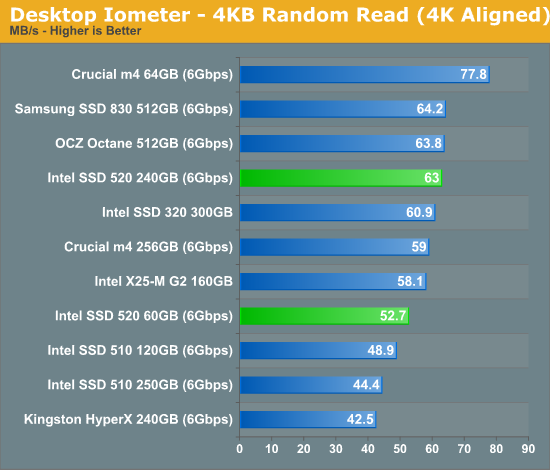
Random read performance seems to have topped out around 60MB/s for most drives and the 520 is no different here.
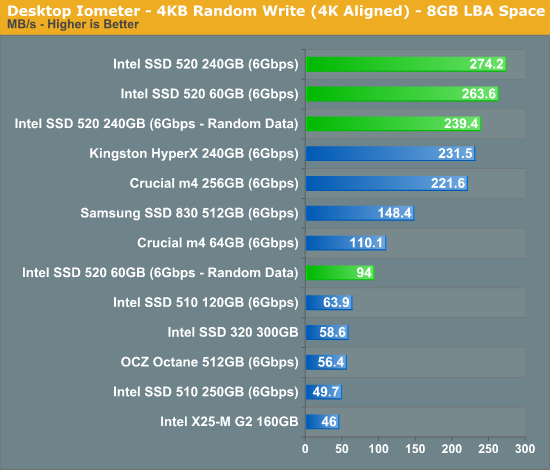
Random write performance, especially with highly compressible data sets the 520 performs beautifully - even outpacing the SF-2281 based Kingston HyperX.
Many of you have asked for random write performance at higher queue depths. What I have below is our 4KB random write test performed at a queue depth of 32 instead of 3. While the vast majority of desktop usage models experience queue depths of 0 - 5, higher depths are possible in heavy I/O (and multi-user) workloads:
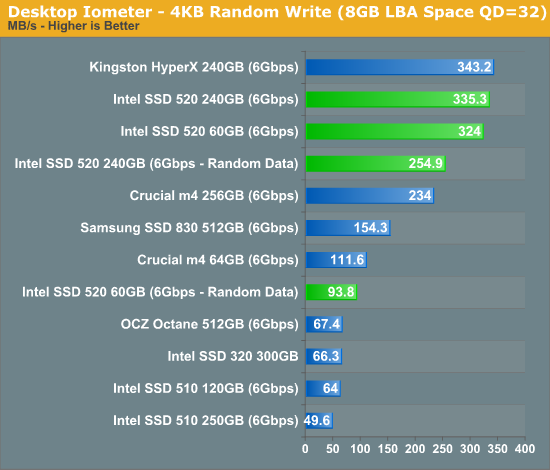
At higher queue depths the HyperX catches up to and surpassed the 520, perhaps indicating that Intel has done some work to optimize low queue depth performance on the 520 (likely what most end users will encounter).
Sequential Read/Write Speed
To measure sequential performance I ran a 1 minute long 128KB sequential test over the entire span of the drive at a queue depth of 1. The results reported are in average MB/s over the entire test length.
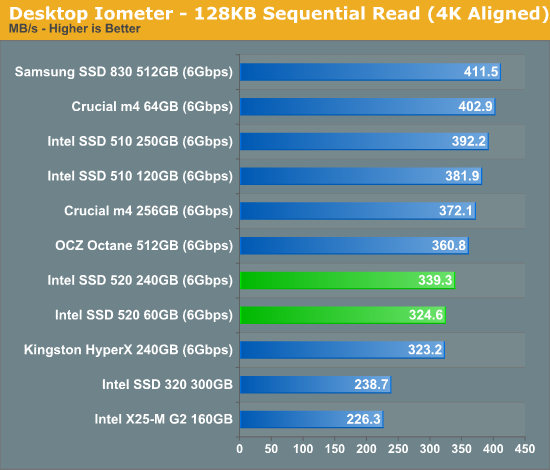
Sequential read performance is actually a bit lower than Intel's 510, but still higher than a standard SF-2281 drive.
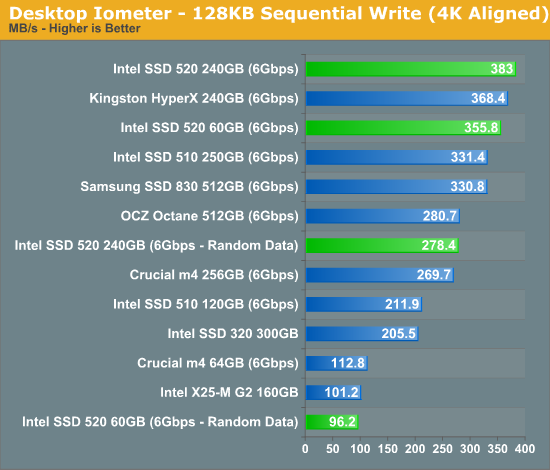
It's important to note just how close the 520's peak random write performance is to its sequential write performance. A big part of this is obviously that the SF-2281 is throwing away a lot of the data it has to write, but even if we compare incompressible 4KB random write to highly compressible 128KB sequential write we see a good ratio. The closer those two values are the more optimal the controller/firmware design is as, in theory, smaller random writes should be grouped to effectively become large sequential writes from the perspective of the NAND.










138 Comments
View All Comments
borynek - Saturday, February 11, 2012 - link
I am very curious how does the encryption option work in Intel SSD 520? Does it use ATA password? When I connect it to another computer or via USB the data cannot be read?schouwla - Monday, February 13, 2012 - link
I am not very excite about the new SSD from Intel. How does it stack up against A-DATA AS510S3-120GM-C that has reads at 550 MB/S and writes at 510 MB/S. A 120G disk is 11500 yen in JapanMadMacMan - Monday, February 13, 2012 - link
I'm what you would call a "power user" I suppose and I've used SSD's for several years. I had an X25-M G1 for the longest time and when Intel decided not to go after the speed crown anymore after the X25-M G2, and instead focus on reliability with the 320, I jumped ship. I love the fact that Intel is BACK with the 520 and although I'm surprised at the controller choice (SF-2281), it's still Intel and while only time will tell if it will have been a good purchase, but I'm going to get the 180GB version of the 520 series.I do have some experience with SF-2281 drives and they are all positive. At first, I was using two 120GB OWC Mercury EXTREME Pro 6G SSD's in RAID 0 in a 2011 Mac mini, which has SATA III (6Gbps) support. They ran like a dream using Apple's software RAID 2.0. Sequential speed tests for reads and writes were consistently above 900MB/s and sometimes approaching the 1GB/s mark, although I never went over. This setup lasted 3 months when I attempted to do the same when I switched into my (Late-2011) 17" MacBook Pro, but due to an issue having SOLELY to do with Apple, I am restricted to using only one of my SSD's. Needless to say, speeds dropped to around 500MB/s, but my machine runs beautifully and is still kick-ass at those rates. (On a side note, when I researched the issue, the 13" MBP, for some inexplicable reason, DOES run beautifully with 2 SSD's from OWC (i.e. SF-2281) in RAID 0, but not the 15" and 17" ones. As I said, this has NOTHING to do with the fact that they are SF-2281 drives.
The bottom line here is that I have had a combined 6 months experience with specifically the SF-2281 from OWC and they have been flawless for me and again, my system is on 24/7 and gets plenty of use. To give you an idea just how much use, I upgraded to 16GB of RAM recently, because 8GB simply wasn't enough.
So as I said, I will sell both of my 120GB OWC drives to raise some money for one of these, most likely the 180GB version. According to one of the charts in the review, the 180GB and 240GB run at almost the exact same speed (as opposed to the 120GB and 60GB variants). That's a sweet spot for me as far as capacity and price point are concerned. I'm looking forward to going back to Intel, although OWC's drives have been great!
e-kirill - Thursday, February 16, 2012 - link
I am thinking about buying Intel 520 180GB for my iMac 27" (mid 2011, MC814, OS X Lion 10.7.3), going to swap factory HDD with sweet (?) Intel 520.What do you think, guys, is it a good choice, considering NO TRIM factor for non-factory SSD under OS X Lion?
Yes, I know about TRIM Enabler (http://www.anandtech.com/show/5453/trim-enabler-20... but I am just ... not sure, how will it work over time.
It would be great to know your thoughts.
Thanx in advance!
SezeMakto - Friday, February 17, 2012 - link
First post ever! I'm torn between 3 SSDs. The Samsung 830 256GB for $340 delivered, the Samsung 830 512GB for $675 delivered, or an Intel 520 240GB for $500 delivered... Any help? Thanks.TheJian - Friday, March 2, 2012 - link
You report Trim doesn't do squat with this drive. Then how do they report trim works in seconds here using SSD Optimizer. You can even set it to scheduled so you don't worry about trim any more:http://www.hardwarecanucks.com/forum/hardware-canu...
If this is true, your whole article needs to be changed to say it's the best drive out there with trim or without even in XP etc.
Am I wrong? I almost bought but now want intel instead. Your article almost steered me to M4 just to avoid sandforce. I'm rethinking that now as maybe Intel really is WORTH the money.
TRIM WORKS FINE ON THIS DRIVE. USE THE TOOLBOX. How did you miss this??
zenith1 - Monday, March 12, 2012 - link
"Performance in this worst case scenario isn't terrible but the fact that it's irrecoverable even after a TRIM is what's most troubling."I am a bit unsure about this worst case scenario, does this mean that if I get into this corner case, there is no way at all to restore the drives performance? It will not help to free up some space or, as a last resort, a secure erase?
Would not mind any pointers on this issue, if it has been thoroughly discussed before. Just a bit mind boggling if there is no solution to this problem.
cansande - Thursday, March 15, 2012 - link
A couple of days ago the price was around 206 for the 120. It dropped to 199 and then 179 today. It looks like Intel may start to be more competitive with ocz and others. 10 dollars more than a vertex 3. Reliability and a 5 year warranty is 10 dollars more. I'll take it.kzinti - Monday, April 16, 2012 - link
I got myself an Intel 520 SSD (180GB) two weeks ago. While installing windows, I got 2 BSOD (dreaded F4), both resuming from hibernate. So I dissable hibernate and any power saving option. The drive worked fine for a week (so I forgot all about it).Then I started getting random freeze and last night, BSOD (F4) within 10 min of each reboot.
This was on an Asus P5K Deluxe, Bios updated to 1005 and ICH9R controller to 8.7.0.1007.
I put back my old system drive to reformat the SSD and that took me a dozen attempt. The SSD drive would keep locking up and disconnecting.
Since I removed the SSD, my system is stable as it always' been.
I am returning it today. I sure hope these new drives aren't plaggued with the same problem.
kzinti - Wednesday, April 18, 2012 - link
Exchanged the faulty SSD and haven't had a single problem in 3 days. The shop guy was genuinely surprised and said no one ever returned an Intel SSD. Well, I guess now there is one. =)